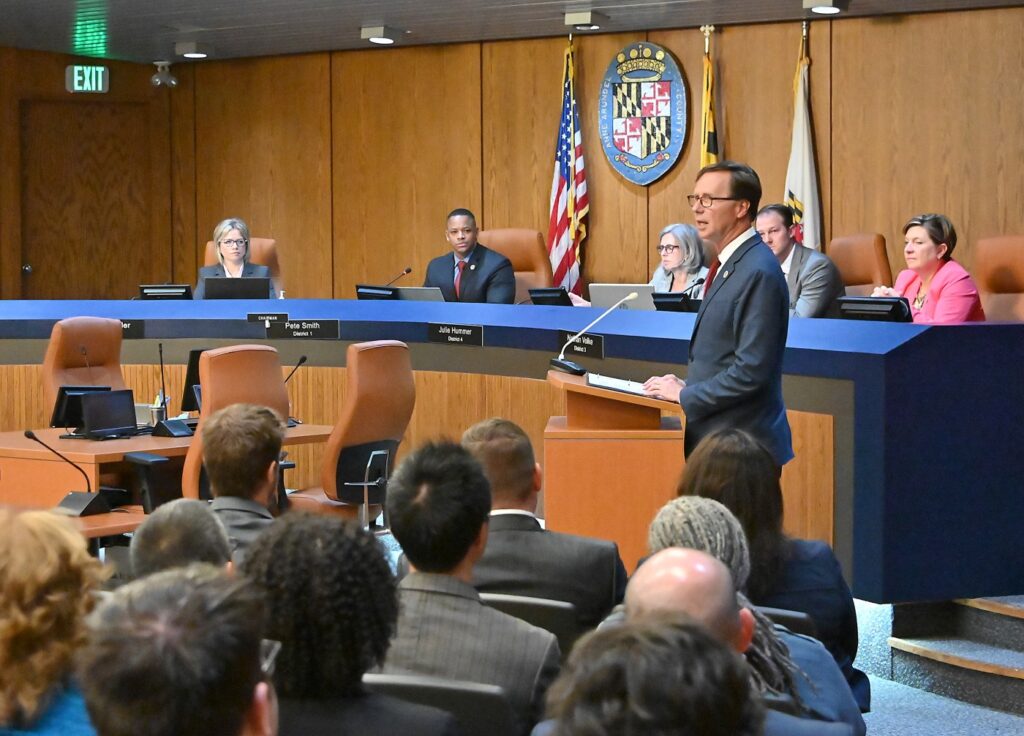Steuart Pittman: A more equitable housing future for Anne Arundel County | GUEST COMMENTARY
- January 8, 2024

Housing instability is the primary portal to poverty for families in our region. Prices are soaring, and so are evictions. Small business owners can’t fill jobs if no housing is accessible to their workers. Local governments must act.
I worked in housing advocacy from the mid-’80s to the mid-’90s and know it’s a frustrating story: same problems, same solutions and same political obstacles to implementing the solutions.
But in Anne Arundel County, a purple microcosm of America, we have created an opening, a narrow path through which progress can squeeze — if nobody gets too greedy.
We engaged thousands of residents in creating Plan2040, a general development plan that called for housing production, inclusionary zoning, smart growth, and environmental protection. We addressed what developers said were their greatest obstacles to housing production in our Office of Planning and Zoning and in our schools’ adequate public facilities law.
We also created an affordable housing trust fund with a dedicated revenue source and a density bonus for workforce housing and an accessory dwelling unit program. After all these concrete steps to increase the housing supply, we asked our developers to support a bill that would require new subdivisions to offer 15% of units at a slightly discounted rate for our moderate-income renters and buyers. We called it the Essential Worker Housing Access Act, and it was very similar to inclusionary zoning policies in nearby counties.
We knew we had a battle on our hands because we’d convened a work group four years ago to draft this bill, and opposition from developers stalled the work. So we organized. Civil rights organizations, labor unions, environmental organizations, a coalition of nonprofit and for-profit affordable housing developers, a coalition of faith- and community-based organizations, and a coalition of neighborhood organizations that was best known for opposing most development all came together to back this bill.
The coalition should have included the Chamber of Commerce, the Association of Realtors and the homebuilders, but it didn’t. I say “it should have” because we gave them most of what they asked for in their initial comments: a waiver of impact fees, a 50% discount on sewer and water connection fees, density bonuses and more. I personally presented those concessions to them and begged for their support, arguing that their only chance of getting the public on board for increasing housing production would be to accept a moderately priced unit requirement.
It didn’t work. All three groups opposed the bill. They wanted the program to be optional. They said they wanted us to do yet another study. And they used the hollow threat we often hear in the face of government regulation, saying that the burden of these moderately priced units would prevent them from building at all, pushing supply down even further.
Unfortunately, the developers got three Republicans and one Democrat on board with their arguments, and they voted to kill the bill, while three Democrats supported it.
Two of those Democrats responded at the next County Council meeting by helping to kill a bill that developers wanted. It was a bill to encourage redevelopment, a smart growth bill that would spur production of housing and commerce at formerly developed sites by removing regulatory obstacles.
I supported putting a temporary hold on the redevelopment bill. We don’t want to accelerate the buildout of our best developable land without knowing that at least 15% of the housing units will be accessible to our essential workers. We don’t want a repeat of the 750 units going up in Annapolis Town Center today, all of which will rent at rates far above what most of our local workforce can pay.
But I still believe that we have that narrow path forward to progress.
But I still believe that we have that narrow path forward to progress. With the urgency of a housing crisis threatening our economy, an acknowledgment that we must increase overall supply without sacrificing the environmental and infrastructure requirements that our residents fought hard to create, and a willingness to find a fair balance between market forces and public interest, the extraordinary coalition that we’ve built in this county will get us our inclusionary housing, our redevelopment incentives and lots of other smart regulatory reforms. My task over the coming months is to grow that coalition to include the Chamber of Commerce, the Association of Realtors and even the homebuilders.
That, with the help of Gov. Wes Moore’s forthcoming legislative package on housing, will open the door to a truly sustainable, more equitable future for our county that can be replicated and spread across the state and country.
Steuart Pittman, a Democrat, is Anne Arundel County executive. He can be reached at countyexecutive@aacounty.org.
Sign Up For Our
Newsletter
Each day, we honor and remember those who have recently passed away.
Most Viewed
More
- Article Obituaries
- Celebrities
- Celebrity News
- Local
- News
- News & Advice
- NFL
- NHL
- Northside
- Norwin
- Obituaries
- Obituary
- Penn Hills
- Pirates
- Pitt
- Pittsburgh
- Plum
- Politics Election
- Sports
- Steelers
- Theater Arts
- Top Stories
- Travel
- Tribune Review Obituaries
- US-World
- Valley News Dispatch
- West End
- Westmoreland
- World